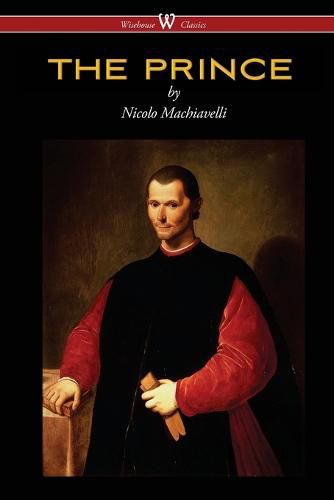Readings Newsletter
Become a Readings Member to make your shopping experience even easier.
Sign in or sign up for free!
You’re not far away from qualifying for FREE standard shipping within Australia
You’ve qualified for FREE standard shipping within Australia
The cart is loading…






This title is printed to order. This book may have been self-published. If so, we cannot guarantee the quality of the content. In the main most books will have gone through the editing process however some may not. We therefore suggest that you be aware of this before ordering this book. If in doubt check either the author or publisher’s details as we are unable to accept any returns unless they are faulty. Please contact us if you have any questions.
THE PRINCE (Italian: Il Principe) is a 16th-century political treatise by the Italian diplomat and political theorist Niccolo Machiavelli. From correspondence a version appears to have been distributed in 1513, using a Latin title, De Principatibus (About Principalities). However, the printed version was not published until 1532, five years after Machiavelli’s death. This was done with the permission of the Medici pope Clement VII, but long before then, in fact since the first appearance of the Prince in manuscript, controversy had swirled about his writings . Although it was written as if it were a traditional work in the mirrors for princes style, it is generally agreed that it was especially innovative. This is only partly because it was written in the vernacular Italian rather than Latin, a practice which had become increasingly popular since the publication of Dante’s Divine Comedy and other works of Renaissance literature.
THE PRINCE is sometimes claimed to be one of the first works of modern philosophy, especially modern political philosophy, in which the effective truth is taken to be more important than any abstract ideal. It was also in direct conflict with the dominant Catholic and scholastic doctrines of the time concerning how to consider politics and ethics. Although it is relatively short, the treatise is the most remembered of Machiavelli’s works and the one most responsible for bringing the word Machiavellian into usage as a pejorative. It also helped make Old Nick an English term for the devil, and even contributed to the modern negative connotations of the words politics and politician in western countries. In terms of subject matter it overlaps with the much longer Discourses on Livy, which was written a few years later. In its use of near-contemporary Italians as examples of people who perpetrated criminal deeds for politics, another lesser-known work by Machiavelli which THE PRINCE has been compared to is the Life of Castruccio Castracani.
The descriptions within THE PRINCE have the general theme of accepting that the aims of princes-such as glory and survival-can justify the use of immoral means to achieve those ends:
He who neglects what is done for what ought to be done, sooner effects his ruin than his preservation.
$9.00 standard shipping within Australia
FREE standard shipping within Australia for orders over $100.00
Express & International shipping calculated at checkout
This title is printed to order. This book may have been self-published. If so, we cannot guarantee the quality of the content. In the main most books will have gone through the editing process however some may not. We therefore suggest that you be aware of this before ordering this book. If in doubt check either the author or publisher’s details as we are unable to accept any returns unless they are faulty. Please contact us if you have any questions.
THE PRINCE (Italian: Il Principe) is a 16th-century political treatise by the Italian diplomat and political theorist Niccolo Machiavelli. From correspondence a version appears to have been distributed in 1513, using a Latin title, De Principatibus (About Principalities). However, the printed version was not published until 1532, five years after Machiavelli’s death. This was done with the permission of the Medici pope Clement VII, but long before then, in fact since the first appearance of the Prince in manuscript, controversy had swirled about his writings . Although it was written as if it were a traditional work in the mirrors for princes style, it is generally agreed that it was especially innovative. This is only partly because it was written in the vernacular Italian rather than Latin, a practice which had become increasingly popular since the publication of Dante’s Divine Comedy and other works of Renaissance literature.
THE PRINCE is sometimes claimed to be one of the first works of modern philosophy, especially modern political philosophy, in which the effective truth is taken to be more important than any abstract ideal. It was also in direct conflict with the dominant Catholic and scholastic doctrines of the time concerning how to consider politics and ethics. Although it is relatively short, the treatise is the most remembered of Machiavelli’s works and the one most responsible for bringing the word Machiavellian into usage as a pejorative. It also helped make Old Nick an English term for the devil, and even contributed to the modern negative connotations of the words politics and politician in western countries. In terms of subject matter it overlaps with the much longer Discourses on Livy, which was written a few years later. In its use of near-contemporary Italians as examples of people who perpetrated criminal deeds for politics, another lesser-known work by Machiavelli which THE PRINCE has been compared to is the Life of Castruccio Castracani.
The descriptions within THE PRINCE have the general theme of accepting that the aims of princes-such as glory and survival-can justify the use of immoral means to achieve those ends:
He who neglects what is done for what ought to be done, sooner effects his ruin than his preservation.